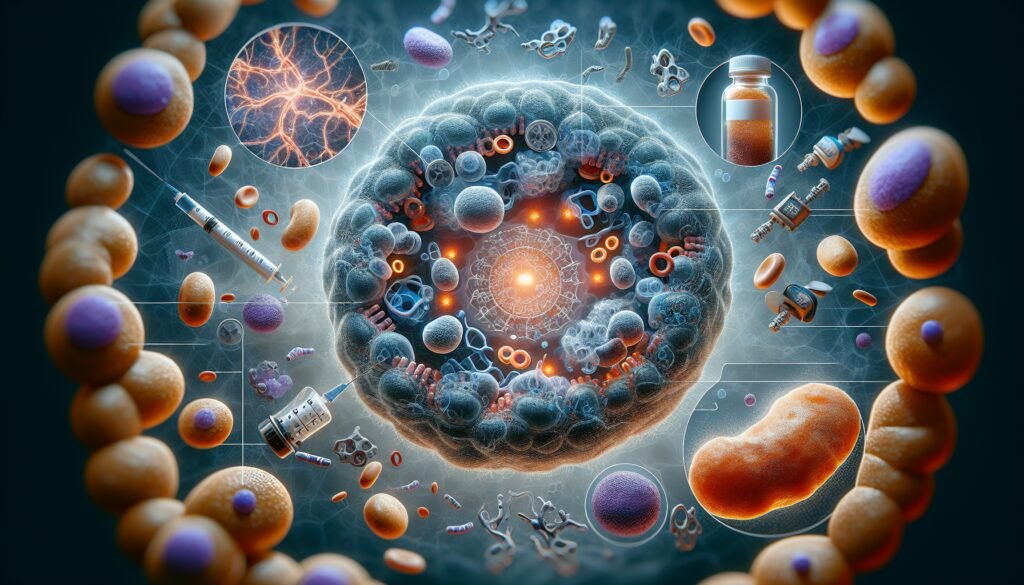
Understanding Insulin Resistance: Causes, Symptoms & Treatment
Insulin resistance is a widespread health condition that affects your body's ability to use insulin effectively. Understanding this condition is fundamental in managing and preventing its progression to more severe health issues.
Often going unnoticed, insulin resistance can lead to prediabetes and Type 2 diabetes if not addressed promptly. Knowledge about the causes, symptoms, and treatment options is crucial for those at risk.












What you\'ll find in this article?
What is insulin resistance?
Insulin resistance is a condition where the body's cells become less responsive to the hormone insulin, which regulates blood sugar levels. This means that higher amounts of insulin are needed to keep blood sugar under control.
When insulin resistance develops, the pancreas produces more insulin to compensate for the inefficiency, leading to high blood glucose levels and potentially Type 2 diabetes.
Understanding the mechanics of insulin resistance is pivotal for anyone looking to maintain optimal health, especially those with prediabetes and other related conditions.
Explore our specialized services in diabetes care 🌟.
From personalized diet plans to effective exercise routines, we have what you need to take control of Type 2 Diabetes.
Visit our services page now!
What causes insulin resistance?
Several factors contribute to the development of insulin resistance. Genetics can play a role, but lifestyle factors such as obesity and lack of physical activity are among the strongest predictors.
Hormonal imbalances, certain medications, and conditions like metabolic syndrome and gestational diabetes are also associated with higher risks of becoming insulin resistant.
Dietary choices, particularly consuming large amounts of sugar and processed foods, can further exacerbate insulin resistance.
What are the symptoms of insulin resistance?
Insulin resistance is often asymptomatic in its early stages, making it hard to detect without medical tests. However, some individuals may experience signs such as fatigue, hunger, and difficulty concentrating.
More visible symptoms include weight gain, high blood pressure, and abnormal lipid levels. These symptoms can be a precursor to more serious conditions like Type 2 diabetes.
It is essential to monitor for these symptoms, especially if you have a family history of diabetes or exhibit risk factors of insulin resistance.
How is insulin resistance diagnosed?
Diagnosis of insulin resistance typically involves blood tests that measure fasting blood sugar levels, insulin levels, and sometimes the glucose tolerance test.
The hemoglobin A1c test is another common method that provides an average blood sugar level over the past three months.
Healthcare providers may also use insulin resistance diagnosis methods like the Homeostatic Model Assessment for Insulin Resistance (HOMA-IR) to determine the severity of the condition.
How can you manage insulin resistance?
Management of insulin resistance focuses on lifestyle changes, such as adopting a healthy diet for insulin resistance and engaging in regular physical activity.
Medications, particularly those that improve insulin sensitivity or lower blood sugar levels, may also be prescribed as part of insulin resistance treatment options.
Regular monitoring and commitment to a proactive health plan are vital in managing insulin resistance effectively.
A comprehensive approach that includes diet, exercise, and potentially medication can help improve blood sugar control and prevent the development of Type 2 diabetes.
Prevention tips for insulin resistance
- Maintain a healthy weight to reduce the risk of developing insulin resistance.
- Engage in at least 150 minutes of moderate-intensity exercise per week.
- Adopt a balanced diet rich in whole grains, vegetables, and lean proteins, while minimizing processed foods and sugars.
- Monitor blood sugar levels regularly, especially if you have risk factors for insulin resistance.
- Consult with healthcare professionals about personalized strategies for insulin resistance prevention.
Here's an informative video that offers additional insights into managing insulin resistance:
What is the main cause of insulin resistance?
The primary cause of insulin resistance is the body's cells not responding effectively to insulin. Factors include excess weight, inactivity, and genetics.
Addressing these underlying causes through lifestyle modifications can significantly reduce the risk of insulin resistance.
What is the fastest way to cure insulin resistance?
While there's no instant cure for insulin resistance, making swift and consistent changes to diet and exercise routines can help improve insulin sensitivity.
Reducing carbohydrate intake and increasing physical activity are the most effective immediate steps you can take.
How do I know if I'm insulin resistant?
Recognizing insulin resistance can be tricky as it often presents no clear symptoms. Observing subtle signs such as increased thirst, frequent urination, and unexplained weight gain can be indicative.
A definite diagnosis, however, requires blood tests and consultation with a healthcare provider.
What happens to your body when you are insulin resistant?
With insulin resistance, your body needs more insulin to get cells to respond and absorb glucose. This can lead to higher insulin production by the pancreas and elevated blood sugar levels, potentially causing serious health issues over time.
It's a condition that needs to be managed proactively to prevent long-term complications like Type 2 diabetes and cardiovascular disease.
✨ Other articles you might be interested in:
- Understanding Diabetes and Skin Complications: Risks and Care Tips
- Navigating Commercial Driving and Diabetes: What You Need to Know
- Understanding Diabetes and Pregnancy | ADA Guidelines
- Exploring the Pathophysiological Impact of Nevro HFX™ High-Frequency (10 kHz) Spinal Cord Stimulation for Painful Diabetic Neuropathy
- Hypoglycemia emergency care plan for low blood glucose situations



